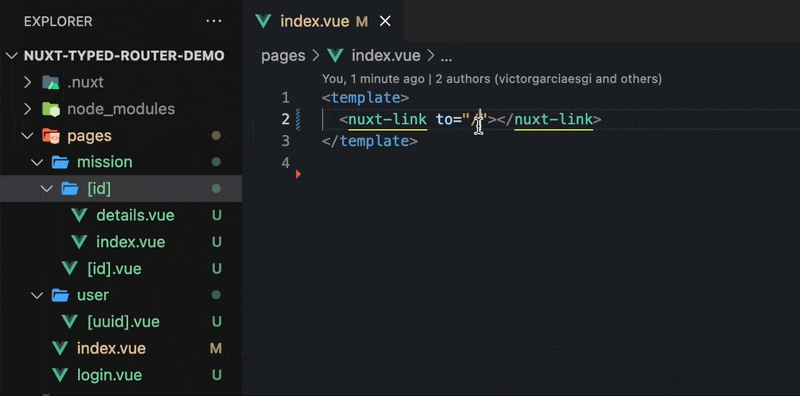Nuxt-Typed-Router
 Provide a type safe router to Nuxt with auto-generated typed definitions for route path, name and params with nuxt-typed-router.
Provide a type safe router to Nuxt with auto-generated typed definitions for route path, name and params with nuxt-typed-router.
- Supports all programmatic navigation utils (NuxtLink, useRouter, navigateTo, useRoute, useLocalePath, etc...)
- Supports optional params and catchAll routes
- Autocompletes routes paths, names and params
- Throw error if route path is invalid
- Out of the box i18n support
- Supports routes extended by config and modules

Documentation
View documentation here
Demo
Play with it on Stackblitz
Tutorial Video
Made by LearnVue
https://www.youtube.com/watch?v=jiYoAiFb71Y&t
Compatibility:
- Nuxt 3
- Nuxt 2 (via nuxt2 branch)
Quick start
For Nuxt 3
yarn add -D nuxt-typed-router
# or
npm install -D nuxt-typed-router
# or
pnpm install -D nuxt-typed-routerNuxt 2 legacy (not maintained)
Nuxt 2 version is no longer maintained, but still available in nuxt2 branch It only has route name autocomplete functionnality
yarn add -D nuxt-typed-router@legacy
# or
npm install -D nuxt-typed-router@legacyConfiguration
Register the module in the nuxt.config.ts, done!
export default defineNuxtConfig({
modules: ['nuxt-typed-router'],
});Example Usage
pages/login.vue
When a route has no params defined, the params property will not even be available as an option in the router.
router.push('/login/bar'); // Error!
router.push({name: 'login', params: {foo: 'bar'}}) // Error!
router.push('/login'); // Good!
router.push({name: 'login'}) // Good! pages/user/[id].vue
When a route has a required param defined, navigating exactly to this route will throw an error if you don't provide a params property or if you put a wrong param.
router.push({name: 'user-id'}) // Error!
router.push({name: 'user-id', params: {bar: 'baz'}}) // Error!
router.push('/user') // Error!
const id = "ey7878"
router.push(`/user/${id}`) // Good!
router.push({name: 'user-id', params: {id}}) // Good!
router.push(`/user/${id}/baguette`) // Error! For resolved routes, the params property will be available and correctly typed.
const route = useRoute();
if (route.name === 'foo') {
console.log(route.params.baz); // Error!
console.log(route.params.foo); // Good!
}

.gif)
